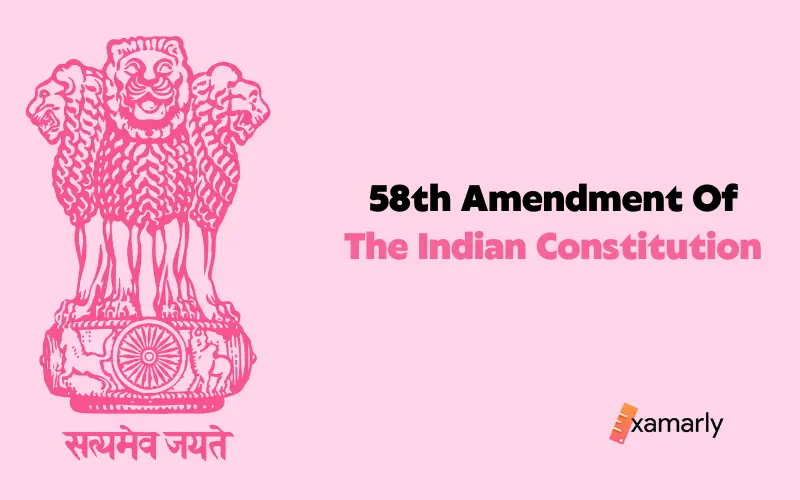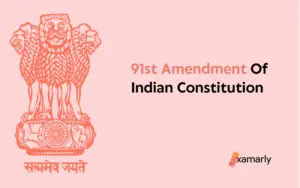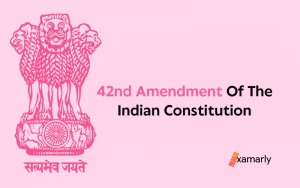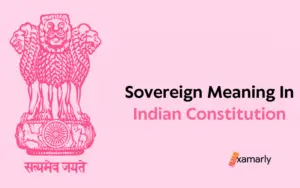This article gives insight into The 58th Amendment of the Indian Constitution- when and why it was implemented, what articles were amended under this act, and many such points.
Briefly explained, this amendment focuses on the involvement of the Hindi translation of the Indian constitution with the same worthiness as when written in the English language.
58th Amendment Of The Indian Constitution
The Constituent Assembly of India accepted the English version of the Constitution of India and every Amendment or law was published in the English language only.
This Amendment came with the provision for the authoritative text of the constitution in the Hindi language and made sure to give equal legal sacredness to the Hindi version of the text.
With the coming of this Amendment, article 394A was also inserted – “Authoritative texts in the Hindi Language”.
Salient Features And Facts
- This Act to be termed as Constitution (Fifty-eighth Amendment) Act, 1987
- In 1950, a Hindi translation of the constitution was also published which was signed by the members of the constituent assembly. The publication was done under the power of the President of the constituent assembly in agreement with the resolution adopted by the assembly.
- Not only a single or more than two but every upcoming amendment to be published should have a Hindi translation with the same sanctity.
- This Act also added Article 394A.
Date Enacted
The 58th Amendment of the Indian Constitution has been enforced since 9th December 1987 under the presidency of R. Venkataraman.
Related – The Constitution (Fifty-eighth Amendment) Act, 1987
Important Provisions
The 58th Amendment of the Indian Constitution witnessed the inclusion of Article 394A and modification in the heading of part XXII along with the shortening of the Title.
Statement Of Objects And Reasons
There are certain objects and reasons for the 58th Amendment-
- The English version of the Constitution of India was adopted by the Constituent Assembly, however, the Constitution was also published in its Hindi version by the President of the Constituent Assembly in 1950.
This Hindi translation was approved and signed by all the members of the Assembly and was in obedience to the resolution adopted by the Assembly. - Soon, the demand rose to include the Hindi translation of every successive amendment in the authoritative text of the Constitution to be published. Additionally, it is crucial to have an authoritative version of the Constitution in order to make it easier to apply it in court.
Moreover, the Hindi version of the text should comply with the language, terminology and style used in the authorized Hindi texts of Central Acts while also adhering to the Hindi translation declared by the Constituent Assembly. - Following the above point, the amendment was proposed to provide the President with the powers to publish the Hindi translation of the Constitution and if the language, style, and terminology of the text are not in compliance with that proposed by the Central Acts, he may modify it accordingly. Any changes made in the English version of the Constitution would also be authorized for publication in Hindi by the President.
See Also – Article 50 Of The Indian Constitution
Objects:-
- The 58th Amendment of the Indian Constitution is now called as Constitution (Fifty-eighth Amendment) Act, 1987.
- The heading of part XXII is slightly modified- Just after the COMMENCEMENT word, “AUTHORITATIVE TEXT IN HINDI” shall be included.
- Addition of Article 394A -After Article 394, the following amended article was included-
Article 394A :
The President of India has the authority to cause publication of –
- The Hindi-translated version of the Indian Constitution with all the amendments. He also ensures whether the Hindi version holds to the language, style, and terminology as proposed by the Central Acts, and if any discrepancy is found, he may change the version accordingly.
- Every amendment that had been written in English should have a Hindi translation as well.
The published Hindi-translated version of the constitution and each amendment should have the same meaning as the original versions. The President may update the translation if any individual finds difficulty in interpreting any text.
For all intents and purposes, the authoritative text of this Constitution in Hindi shall be understood to be its translation, as well as any amendments issued under this article.
Summing Up
The 58th Amendment of the Indian Constitution brings about changes in the way the Constitution was written. Initially, the whole constitution was written in English, but with the introduction of the 58th Amendment, the provision to have a Hindi version of the Constitution came into force.
Moreover, every subsequent amendment shall also be written in Hindi along with the English language and should have the same sanctity as that of the English version. The President holds the authority to bring about any changes in the Hindi translation if it does not obey the criteria set by Central Acts regarding the language, style, and terminology.
Also, Article 394 was amended to 394A- “Authoritative texts in the Hindi Language”.
FAQ’s
When was the 58th Amendment of the Indian Constitution was enforced?
The 58th Amendment of the Indian Constitution has been enforced since 9th December 1987.
What is the 58th Amendment of the Indian Constitution?
The 58th Amendment brings the inclusion of a Hindi translation of the Indian Constitution and subsequent amendments should also have a Hindi translation.
Which Article was amended in this Act?
Article 394 was amended to Article 394A.






